- Home
- Anne McCaffrey
To Ride Pegasus Page 3
To Ride Pegasus Read online
Page 3
Just another of those paradoxes which assailed them from all sides now that Talent was respectable. By removing the onus of haphazard performance, by having Talents registered with the Center, they could contract for premium wages. But suddenly the Talents were also elevated into the genus “pariah,” found themselves untouchables, unwelcome and feared, all through misunderstanding.
Watson Claire was mounting a massive soft-sell public information program, abetted by his contacts in the media profession who were delighted at something newsworthy. Judiciously applied blackmail kept the worst newsmongers at bay. But it would take time, Claire said (and Henry understood), for the program to seep down to the level where it was most required … in the housing developments which were now ousting anyone suspected of possessing Talent.
Well, the immense warehouse Henry had leased in the dock area would suffice until he’d figured out how to appeal to George Henner. That financial wizard had an accounting to make and Henry was vastly amused by recent findings. It was going to be fun watching Henner’s reactions.
He picked up the comunit to call the warehouse: the shielding had been in place a week ago so there had been just the finishing of the living quarters. Maybe he should have used telekinetics to move his furnishings? No, that would be a bad scene, however personally satisfying it might be. Some things even Talents had better do the usual way.
“My name is Henry Darrow, Commissioner Mailer. This is my wife, Molly; Barbara Holland is our finder, and Jerry comes along to lug the Goosegg. I believe this is your list of most wanteds?”
“Just what is this?” The Commissioner for Law Enforcement and Order had risen in indignation from his paper-free desk. “My appointment was with James Marshall, not you, Darrow.”
“I know. Jim got it for us because you’ve refused to see …”
“A bunch of tearoom crackpots!”
“Well, we’re here and you’re going to listen …”
“Not if I have any say …” The Commissioner was fumbling with his desk set and swore when the telltale lights did not wink on at his touch.
“It won’t work, Commissioner Mailer,” Henry told him. “I forgot to mention that Jerry’s telekinetic and keeps closing the switches as soon as you press. Sorry. You’re incommunicado until you listen. And watch. Barbara, if you would, please? Here’s the list. Just sit here. Ready, Molly?”
The Commissioner’s raging did him no good since his office was soundproofed. He continued to fumble futilely with his comunit, unable to believe that it wouldn’t function because some nondescript young man stared at it. He didn’t notice that Molly was quietly placing the electrode net on Barbara’s head. The girl adjusted it into the scalped spots in her hair and nodded to Hairy.
“I gather these are in order of preference?” Henry asked the Commissioner. Henry perched on the desk, unperturbed by the Commissioner’s belligerence and profanity.
“Preference? What’n’hell are you talking about, Darrow? Get your circus out of here. This is a law enforcement and order …”
“Neither of which you are able to maintain with the current restrictions on your men,” said Henry, interrupting with such a forceful tone that the Commissioner’s sputtering died and he stared at Darrow in amazement. Few people had addressed the LEO man in that tone of voice. “That’s why I’m here, to render assistance you can’t get from any other agency. Now sit down, shut up, and listen. Who do you want us to find for you first?”
“Find?”
“Find!”
The two men locked eyes and there was a quality in Henry’s that wrought a sudden change in the Commissioner.
“All right,” Mailer said in a tight hard voice, “find me the man they call Joe Blow.”
“The Joy Pill man?”
“That’s him.”
Henry flicked out the second IBM card and handed it to Barbara Holland.
“Enough for you, Babs?”
The girl studied the sketch drawn by police artists from verbal descriptions of victims of the elusive Joe Blow. She read the notations on his most frequented locations, his general modus operandi. Then she looked up at Henry with a grin.
“This isn’t a really fair test, Henry,” she said.
“Hal” exclaimed the Commissioner, an unholy delight in his eyes.
“No,” said Barbara, “because I’ve encountered him so it’s easy to track him down.” She closed her eyes, clasping the card between her hands. The needles on the Goosegg began to whip across the graph paper. Her smile widened and she opened her eyes. “He’s on the corner of 4th Avenue New East and 197th Street. He’s wearing a long blue duty mac, with waterproofed shoulders, and a long blond wig. No moustaches today. He’s carrying nothing illegal but he has a great deal of money on him and some folded papers.”
The Commissioner was fumbling with his comunit. “For God’s sake release it or whatever. I’ve got to get …”
“Why?” asked Barbara. “You want him with dust or acid or the Brown Joy, don’t you?”
“I want him in any way.”
“Can you charge him?”
“I’ve only got to get him …”
Suddenly the commit came alive on every previously pressed band, but the Commissioner got it sorted out and had a squad vehicle dispatched to the coordinates, to apprehend a man answering Barbara’s description. Then he turned back, smiling sourly at the four people. “We’ll see what we’ll see. If such a man is there, we’ll have him in three minutes. My people are quick and efficient”
“So are mine,” said Henry and looked expectantly at Barbara, who nodded.
“What’s that all about?” demanded the Commissioner.
“I’m keeping track of him,” Barbara replied, and suddenly the third band began to show activity.
“That is the Goosegg at work, Commissioner Mailer,” said Henry.
“Are you reading my mind?” Mailer looked alarmed and angrier.
“Not at all,” Henry replied. “I’m not a telepath. I’m a tea leaf reader on a grandiose scale …”
The Commissioner pursed his lips to hear his own description of Henry Darrow thrown back at him.
“All right, then, tell me now if my men’ll succeed?”
“Barbara can tell you better than I. I don’t deal generally with individuals. My specialty is mass movement. But Barbara can find Joe Blow for you now and any time you want to check on his whereabouts …”
“They have him,” Barbara said, and held out her hand for another card.
The Commissioner stared at her suspiciously.
“Oh, let’s let his men tell him, Babs.”
She shrugged and settled back in her chair. Then brightened and smiled sweetly at Mailer. “You left your pipe in your ski jacket, Commissioner, the blue one which you don’t usually wear. If you call home right now, you’ll find your wife there. And remind her the coat is under your red dressing robe in the first closet.”
Mailer regarded her with narrowed eyes. “I thought you said you weren’t a mind reader.”
“I never said that,” Barbara replied, then pointed to Henry. “He did. And I can only get impressions of lost articles. You did lose the pipe and were just now thinking where had you put it. And the only reason I know about your wife is because you say you can never find her when you need her.” Barbara kept her face very straight but Henry knew her to be possessed of a sense of devilment, very much in evidence under that air of innocent helpfulness.
This “finding” was making far more impression on the Commissioner than her location of Joe Blow.
The comunit buzzed.
“They picked up a man, answering that description. What do they do with him? He’s demanding rights.”
Mailer was unprepared for only one moment. “Search him. There’s been a local robbery and a man answering his description was seen nearby. You’re supposed to find a wad of credits and papers. Invoke citizen search prerogative.”
“He’s carrying roughly 8000 credits, sir,” sa
id Barbara.
“The heist was 8000.”
There was a second long tense silence.
“He’s got it, sir.”
“Book him!”
The fleeting expressions on Mailer’s face now told of intense mental conflict. He was a man to whom a miracle had been offered and he was too scared to accept it.
“Barbara is parapsychic, Commissioner. We brought Goosegg in to prove to you on a scientific basis as reliable as ballistics, without a tea leaf in sight, that her mind generates a specific type of electrical impulse when she uses her parapsychic Talent. She can’t read your mind except when you, or anyone, are worrying about something lost, strayed or stolen …”
“Stolen—” The Commissioner pounced on the word.
“If you mean that hijacked shipment of crowd gas, Commissioner,” said Barbara, “it’s in a warehouse, with a southside feel. It’s very dark inside, which hampers me: I can’t see in shadows. I can make out some white airfreight containers, they’ve a plastic feel, rather than wood or steel. There’s a geometric design in dark paint in the lower left hand side.” She frowned and the Goosegg chattered rapidly for a moment and then toned down to a mild, normal swing. “I’m sorry. There simply isn’t enough light there.”
The Commissioner snorted but her information had obviously given him something to work on. “South side … air freight … white …” His fist slapped down an end key. “Jack … what air freight companies use white containers with geometric designs in lower left hand … Oh, they do. Now, what air freight companies use southside depots … Oh. Hmmm. Well, check your contacts like right now.” He turned a cold dispassionate look on Barbara. “You can’t be more specific?”
Barbara gave Henry a quick glance before answering. “I’ve already narrowed the search to a small section of the city with as many specifics as I can see. There can’t be that many warehouses for air freight! I’ve done more than you’ve been able to, Mr. Mailer.”
“Now, just a minute, young lady …”
“You’ve had more than a minute, Commissioner, and my time is valuable.” Barbara was on her feet, the electrode net in her hand. “We’re wasting time with this one, Henry. And I don’t like him. Miserable vibes from him, just miserable!”
She left the room. Molly quietly began to pack up the Goosegg while the Commissioner stared first at the open door and then at Henry.
“She operates more efficiently with an occasional word or two of thanks, Mailer. Most people do.” Henry gathered Molly into the curve of his arm, motioned courteously to Jerry to take the Goosegg and wishing Mailer a pleasant good-day, left.
“Hey, just a minute …”
Henry turned at the door. “As Babs said, Mailer, you’ve had more than a minute and our time is valuable.”
“Does Charity have to be sedated again, Gus?” Henry asked the Center’s physician. “We’ve got her a temporary contract to find out the troublemaker in the Arrow Shirt Company.”
Gus ducked his head, his face twisted into a grimace, wanting to say no and having to say yes. He leaned against the now flagged door to Charity McGillicuddy’s two roomed accommodation on the living floor of the Center’s warehouse building.
“Even with the shielding we’ve got, Hank, it’s not enough privacy for the empaths and telepaths. Not enough physical distance. No way to get out and away from ourselves, if you get what I mean. We’re sort of all crammed into this warren despite the conveniences and amenities. You might say, it’s too much of a good thing … too close a buddy-buddy act. Like an overdose of euphorics. Everyone’s high here on sheer good fellowship. And it’s much too much for Charity.”
Henry looked towards the corridor window with the projection of sunlight on the grass, a huge spreading beech tree, russet against an autumnally blue sky. Though it was so realistic that the leaves moved gently and the angle of sunlight altered slowly, Henry knew it to be only a projection and his mind would not accept the fantasy that deluded millions of warren dwellers.
“Talent requires certain realities not obtainable in this age,” Gus went on. “And one of the most important is physical freedom and elbow room.” He snorted, aware of the impossibility of fulfilling that requirement in Jerhattan’s overcrowded boundaries.
“We’ve been offered that old game preserve in …”
“Too goddamned far to commute and most of us gotta.” Molnar was head neurologist at the Midtown Hospital Center although he spent more time as the Center’s physician.
“Okay,” Henry said, “I’ll do what I can.”
“Henry?” Gus eyed his friend suspiciously. “What are you up to now?”
“Me? Nothing.” Then Henry Darrow assumed a crouched stance and rubbed his hands together, chuckling evilly. “But Destiny … haha HA! I know when we twain shall meet. Soon!”
Gus rolled his eyes heavenward to deal with Henry Darrow in this whimsical mood.
“Oh, don’t worry, Gus,” Henry said in a normal voice. “I usually call ’em, you know.”
Gus nodded sourly.
“Content yourself,” Henry continued, “with the enticing thoughts of dissecting my brain when I die, and trying to figure out just how I do it.”
“Ha!”
“You can’t subpoena Barbara Holland, not on those grounds, Commissioner Mailer,” Henry Darrow said. “But you can hire her services from the Center …”
“What Center?” demanded Mailer, looking scornfully around the minuscule space that served as Henry’s office.
“The Center we’ll shortly acquire with the wages you’ll be paying Talents like Barbara, and Titter Beyley and Gil Grade and …”
“Titter Beyley?” The Commissioner hovered on the verge of apoplexy.
“Yes, Titter. He drank to stop finding things. Alcohol affects the parapsychic faculty, sometimes it inhibits, as in Titter’s case; sometimes it sharpens.”
“Now, just a minute, Darrow …”
“My minutes are valuable, Mailer. I only have so many. You want things and people found: Barbara has that faculty and so does Titter Beyley. Actually Titter’s much better for inanimate objects than Barbara. He doesn’t like people. And the day you find out he’s been drunk on duty, then complain.”
“And you mean to stand there, young man, and tell me that I’m going to get shot at Saturday? Again!” Governor Lawson tipped his chair back and roared with laughter: an exercise he broke off abruptly to glare with an intensity akin to hatred at Darrow and the wraith-like Steve Hawkins. “So what else is new?”
“The predictive Incident says that a .38 slug will penetrate the right ventricle.” Steve’s voice shook slightly. Henry wondered if he’d made a mistake in bringing Steve, who was very new to his gifts and the Center’s staff. “The man will approach from the left …”
“What does it matter where he comes from?” The Governor said, sharply, hostilely. “Oh, I don’t disbelieve you, Darrow. Or you, Hawkins. I’ve heard too much about you people to be skeptical anymore. But, if I don’t appear …”
“You have to appear,” Henry replied. “We ran the alternates through a probability computation and find that your appearance at that Forum Meeting must take place to sway a currently uncommitted 8% of the popular vote to your party. Without that 8%, you fail to receive the critical majority and if you fail, the Laborites can obtain the plurality they need to effect a counter-measure that would have disastrous consequences on the economy.”
Governor Lawson began a chuckle, his belly shaking first before the amusement was shunted up the rotund abdomen to the chest and finally became audible in the head cavity. Finally Lawson’s lips parted to emit a rich, juicy laugh.
“So, that’s the way it’ll be, huh?”
“Yes, if your eloquence doesn’t falter with foreknowledge.”
“Huh? How’s that?”
“You have been given a prescience of the immediate future. Such knowledge could, in itself, alter the circumstances of the future. We do not always have either the personnel o
r the foresight to modify the future. In your case, we make an exception. A Laborite Majority is not a good thing for the Talented.”
Governor Lawson nodded in appreciation of that expediency.
“Your man will intercept the bullet?”
Henry nodded.
“And the nut will be put away? That’s better than leaving him free for another shot Good! How many political figures does your group protect?”
“Those who need it. And we’d appreciate a kindly word for the Center when Steve diverts that bullet.”
Lawson nodded agreement. “Those who need protection? Or those whom you need, Darrow? No, don’t answer that one. Answer this … will I win this election?”
Henry smiled slowly. “You know the answer to that one, Governor, but the fun lies in making certain you’ve played the game right.”
“How far do you guys play fun and games?”
“Just far enough!”
“Now, Mr. Rambley, what seems to be your problem?”
“Not my problem, Mr. Darrow. Yours!” The Internal Revenue Department man smiled a thin smug smile and began to pull IBM cards from his neat fake-pig case.
“Really?”
“We have here WT forms from the Department of Law Enforcement and Order, from Johns Hopkins, Bethel General, Midtown, from Dupont Merck Pharmaceuticals … need I go on?”
“Just as you please.”
“These salary chits represent the earnings of Barbara Holland, Titter Beyley, Charity McGillicuddy, Gil Gracie, Frank Negelsco, Augustus Molnar …” Again the IRD representative regarded Henry Darrow with a cute expression on his fleshless face. “I could continue …”
“Just as you please. I give every government official the courtesy due his office.” Henry inclined his head towards Mr. Rambley who, for the first time since he’d minced into Henry’s tiny lair, looked nonplussed. “After all, some of my best people are employed by the government.”
With an irritated sigh, Rambley dosed the stack of cards and tapped them in an admonitory fashion on the desk.
“Come now, Mr. Darrow. These people,” and he brandished the cards, “earn tremendous salaries and yet there is no record of a single tax deduction, no returns …”

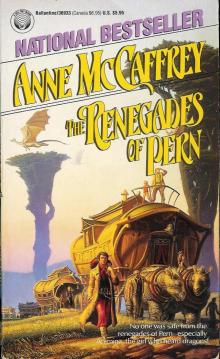 The Renegades of Pern (dragon riders of pern)
The Renegades of Pern (dragon riders of pern)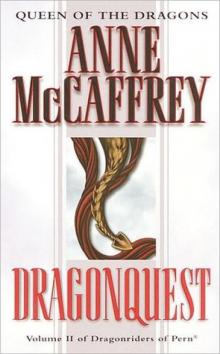 Dragonquest
Dragonquest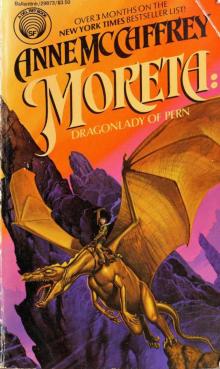 Moreta (Dragonlady of Pern)
Moreta (Dragonlady of Pern)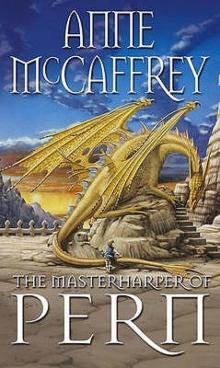 The Masterharper of Pern
The Masterharper of Pern If Wishes Were Horses
If Wishes Were Horses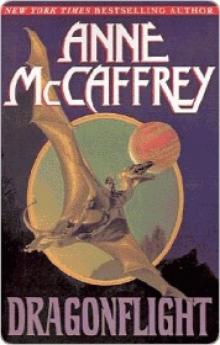 Dragonflight
Dragonflight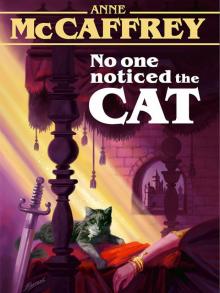 No One Noticed the Cat
No One Noticed the Cat The White Dragon
The White Dragon A Gift of Dragons
A Gift of Dragons Harper Hall - Dragonsong
Harper Hall - Dragonsong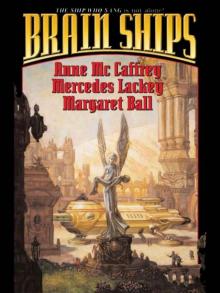 Brain Ships
Brain Ships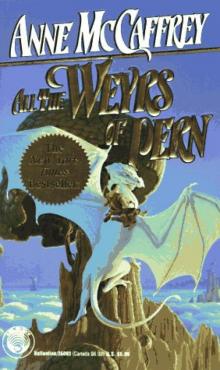 All The Weyrs of Pern
All The Weyrs of Pern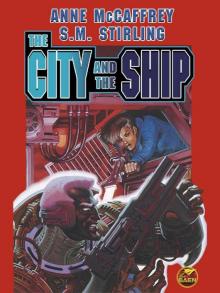 The City and the Ship
The City and the Ship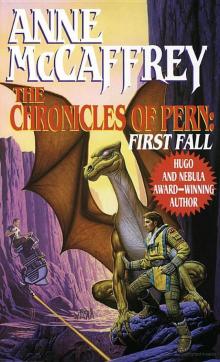 The Chronicles of Pern: First Fall
The Chronicles of Pern: First Fall Acorna’s Search
Acorna’s Search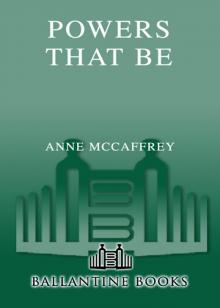 Powers That Be
Powers That Be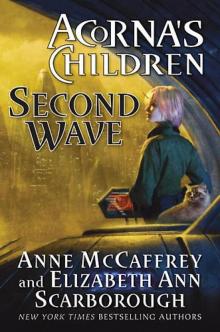 Second Wave
Second Wave Chronicles of Pern (First Fall)
Chronicles of Pern (First Fall)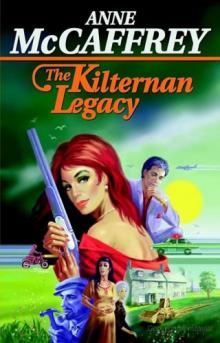 The Kilternan Legacy
The Kilternan Legacy Decision at Doona
Decision at Doona Dragondrums (dragon riders of pern)
Dragondrums (dragon riders of pern)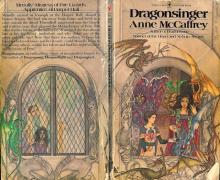 Dragonsinger (dragon riders of pern)
Dragonsinger (dragon riders of pern) The Master Harper of Pern
The Master Harper of Pern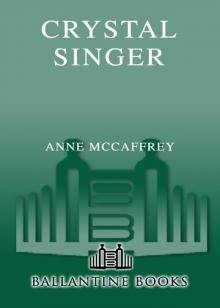 Crystal Singer
Crystal Singer Acorna’s People
Acorna’s People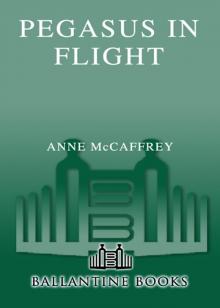 Pegasus in Flight
Pegasus in Flight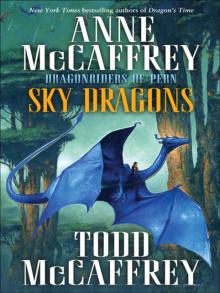 Sky Dragons Dragonriders of Pern
Sky Dragons Dragonriders of Pern Dragonriders of Pern 4 - Dragonsinger
Dragonriders of Pern 4 - Dragonsinger Treaty at Doona
Treaty at Doona Damia's Children
Damia's Children Stitch In Snow
Stitch In Snow The Rowan
The Rowan Dinosaur Planet
Dinosaur Planet The Year of the Lucy
The Year of the Lucy The White Dragon p-4
The White Dragon p-4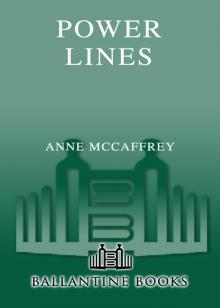 Power Lines
Power Lines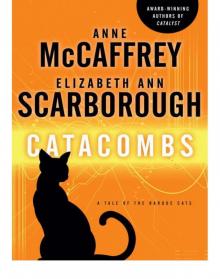 Catacombs
Catacombs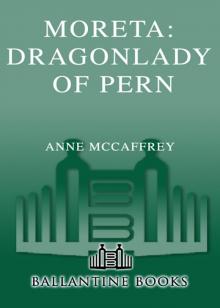 Moreta
Moreta Dragonsinger
Dragonsinger Crystal Line
Crystal Line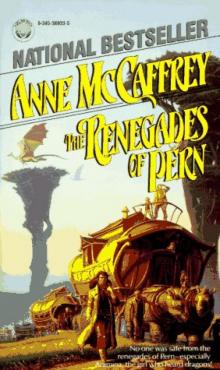 The Renegades of Pern
The Renegades of Pern Moreta - Dragonlady of Pern p-8
Moreta - Dragonlady of Pern p-8 Deluge
Deluge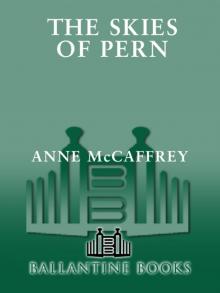 The Skies of Pern
The Skies of Pern Acorna's Quest
Acorna's Quest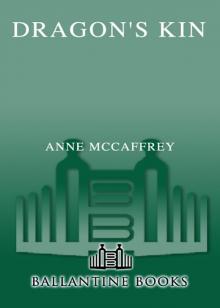 Dragon's Kin
Dragon's Kin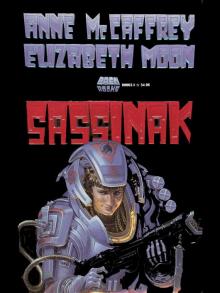 Sassinak
Sassinak![Crystal Universe - [Crystal Singer 03] - Crystal Line Read online](http://i1.bookreadfree.com/i1/03/31/crystal_universe_-_crystal_singer_03_-_crystal_line_preview.jpg) Crystal Universe - [Crystal Singer 03] - Crystal Line
Crystal Universe - [Crystal Singer 03] - Crystal Line Freedom's Landing
Freedom's Landing Acorna’s Quest
Acorna’s Quest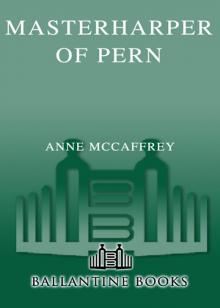 Masterharper of Pern
Masterharper of Pern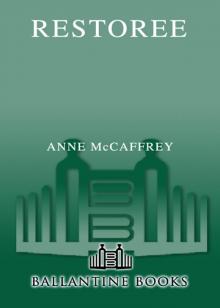 Restoree
Restoree Dolphins of Pern
Dolphins of Pern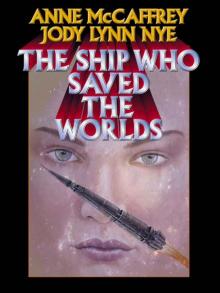 The Ship Who Saved the Worlds
The Ship Who Saved the Worlds Acorna's Triumph
Acorna's Triumph Acorna's Rebels
Acorna's Rebels![[Acorna 08] - First Warning: Acorna's Children (with Elizabeth Ann Scarborough) Read online](http://i1.bookreadfree.com/i1/04/06/acorna_08_-_first_warning_acornas_children_with_elizabeth_ann_scarborough_preview.jpg) [Acorna 08] - First Warning: Acorna's Children (with Elizabeth Ann Scarborough)
[Acorna 08] - First Warning: Acorna's Children (with Elizabeth Ann Scarborough) Dragonsong (dragon riders of pern)
Dragonsong (dragon riders of pern) Dragonriders of Pern 6 - Dragondrums
Dragonriders of Pern 6 - Dragondrums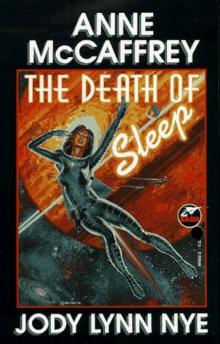 The Death of Sleep
The Death of Sleep Crisis On Doona
Crisis On Doona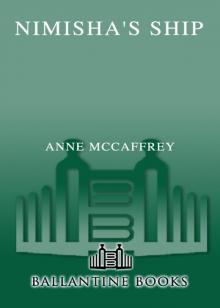 Nimisha's Ship
Nimisha's Ship Black Horses for the King
Black Horses for the King Changelings
Changelings Freedom's Choice
Freedom's Choice The Lady
The Lady The Coelura
The Coelura Catalyst
Catalyst The Unicorn Girl
The Unicorn Girl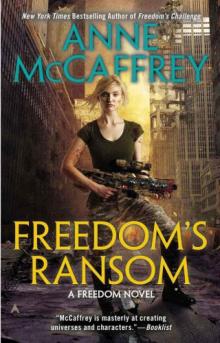 Freedom's Ransom
Freedom's Ransom Nerilka's Story
Nerilka's Story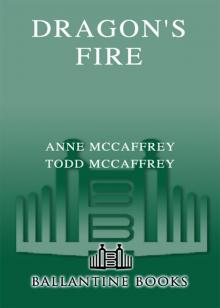 Dragon's Fire
Dragon's Fire Generation Warriors
Generation Warriors Lyon's Pride
Lyon's Pride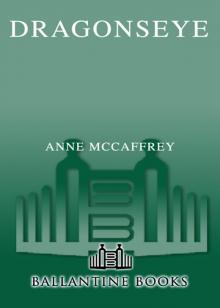 Dragonseye
Dragonseye Dragon Quest
Dragon Quest Dragondrums
Dragondrums Dragonsong
Dragonsong The Mystery of Ireta
The Mystery of Ireta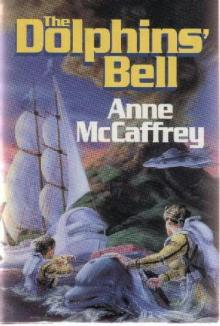 Dolphins' Bell
Dolphins' Bell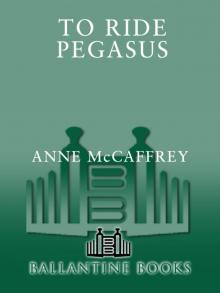 To Ride Pegasus
To Ride Pegasus Power Play
Power Play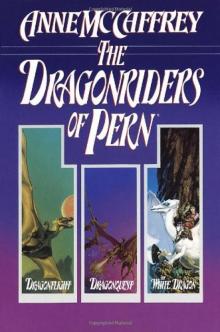 The Dragonriders of Pern
The Dragonriders of Pern An Exchange of Gifts
An Exchange of Gifts The Ship Who Sang
The Ship Who Sang Sky Dragons: Dragonriders of Pern
Sky Dragons: Dragonriders of Pern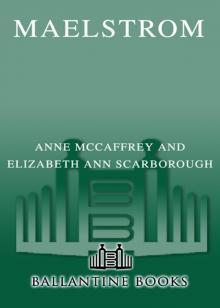 Maelstrom
Maelstrom Dragons Dawn
Dragons Dawn Dragon Song
Dragon Song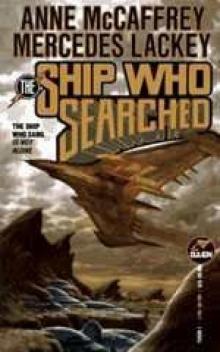 The Ship Who Searched b-3
The Ship Who Searched b-3 Damia
Damia Freedom's Challenge
Freedom's Challenge